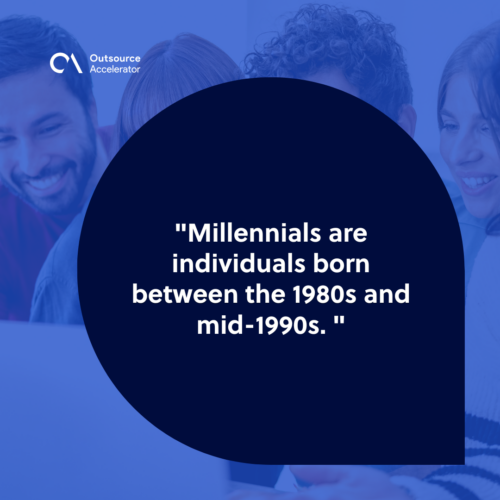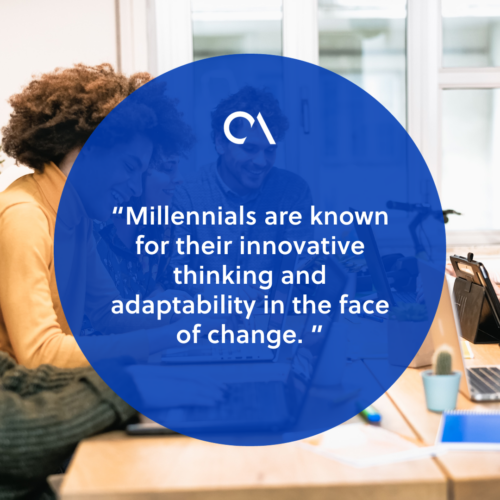Millennials in the workplace: Who they are and how to manage them

Over the years, millennials have become a significant presence in the modern workforce, bringing unique characteristics and expectations.
With Gen Z entering the workplace and the older ones retiring, they are now the next in line to lead and manage teams. This is why getting to know their characteristics and ethics is crucial.
This article will explore millennials in the workplace and how to manage them effectively.
Who are the millennials?
Millennials are individuals born between the 1980s and mid-1990s. They represent an overwhelming majority of the workforce, projected to reach around 75% by 2025
Millennials grew up during technological advancement and various economic crises. They are the first generation to have grown up with the internet and are often called “digital natives.”
Their exposure to technology from an early age has shaped their worldview, communication style, and expectations in the workplace.

Characteristics of millennials in the workplace
Compared to their predecessors, Millennials’ work ethics and characteristics are affected by the crises their families have experienced. This is why they are considered more progressive and straightforward.
Here are some of the characteristics of millennials in the workplace:
Collaboration and teamwork
Millennials value collaboration and teamwork. They have been raised in an environment that emphasizes group activities and cooperation.
This generation thrives when allowed to work in a team-based environment, leveraging diverse skill sets to solve problems and achieve common goals.
Desire for purpose-driven work
Millennials seek meaning in their work. They want to feel a sense of purpose and contribute to something larger than themselves.
Sustainability is one of the aspects they are attracted to. Based on studies by Korn Ferry, around 54% of millennials consider changing their roles for a more sustainability-focused one.
This is why employers must align the organization’s mission and values with millennials’ aspirations and values.
Embrace of technology
Having grown up with technology at their fingertips, millennials are comfortable using various digital tools and platforms.
They quickly adapt to new technologies and appreciate organizations that leverage technology to streamline processes and enhance productivity.
Passion for continuous learning
Millennials have a strong desire for continuous learning and development. They value opportunities to grow their skills and knowledge and expect employers to provide ongoing training and career advancement.
Companies that invest in the professional development of millennials are likely to attract and retain top talent from this generation.
Need for work-life balance
Unlike previous generations, millennials place a high value on work-life balance based on various studies. They prioritize personal well-being and flexibility in the workplace.
Employers that offer flexible work arrangements, like remote work options, are more likely to attract and retain millennial employees.
Benefits of having millennials in the workplace
Many millennials are still relatively young. With this, they can bring similar advantages as their Gen Z counterparts.
Having millennials in the workplace can bring you the following benefits:
Innovation and adaptability
Millennials are known for their innovative thinking and adaptability in the face of change. They bring fresh perspectives and ideas, challenging traditional ways of doing things.
Embracing their creativity and openness to change can lead to increased organizational innovation.

Tech-savviness
With their deep understanding of technology, millennials can bring valuable technological skills to the workplace. They can help organizations stay updated with the latest trends and leverage technology to improve efficiency and effectiveness.
Diversity and inclusion
Millennials are often recognized for their appreciation of diversity and inclusion. They believe these elements lead to better collaboration, creativity, and problem-solving.
Employers prioritizing diversity and providing an inclusive environment are more likely to attract millennial workers.
Social media and marketing expertise
Millennials are well-versed in social media platforms and deeply understand digital marketing strategies. Their extensive knowledge can help organizations reach and convert their target audiences.
Energy and enthusiasm
Millennials bring a unique energy and enthusiasm to the workplace. They are often eager to make a positive impact in their organizations.
Their passion and motivation can be contagious, influencing the overall work environment.
Potential problems with millennials in the workplace
While millennial workers bring many advantages, there can be potential challenges when managing this generation, like below.
Shorter tenure
Millennials tend to stay at a company for a shorter period compared to their predecessors.
Per the Bureau of Labor Statistics, boomers (aged 55 to 64) stay in a company an average of 9.8 years, while millennials stay at an average of 2.8 years.
Vulnerability to burnout
Workplace burnout is most common among Gen Zs and millennials in the workplace. This is because they are largely affected by various crises and issues in and out of work.
Being upfront with diplomacy
Millennials’ outspoken nature in business diplomacy can be double-edged at times.
While they can help develop a company’s culture, they could communicate their approach in ways employers think can be disrespectful.
How to engage millennials in the workplace
To effectively engage millennials in the workplace, employers should consider the following strategies:
Provide opportunities for growth and development
Continuous learning opportunities and career development programs can help millennials feel valued and invested in their personal and professional growth.
This can include mentorship programs, training workshops, and opportunities for advancement within the organization.
Foster a collaborative and inclusive culture
Creating a workplace culture that values collaboration and inclusion is essential for engaging millennials.
Encourage teamwork, provide platforms for open communication, and celebrate diversity to foster a sense of belonging and purpose.
Offer flexible work arrangements
Recognize the importance of work-life balance to millennials by offering flexible work arrangements. This can include options for remote work, flexible schedules, and allowing time off for personal pursuits.
Providing flexibility shows trust and empowers millennials to manage their work and personal lives effectively.\

Rise of millennials in the workplace
Millennials cover the largest generation in the workforce, surpassing baby boomers. They are shaping the future of work with their unique characteristics and expectations.
Organizations that recognize and adapt to the needs of millennials will be better positioned to attract, engage, and retain top talent in the evolving business landscape.
Understanding who millennials are and how to manage them in the workplace is essential for organizations seeking long-term success.
Employers must embrace millennials’ strengths, address potential challenges, and implement engagement strategies. Doing so can help them create a thriving workplace that fosters innovation, inclusivity, and growth.







 Independent
Independent




